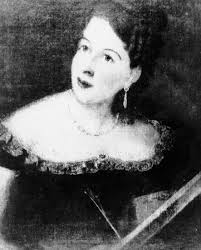Associate Professor Anna Johnston
“I am passionate about expanding knowledge about Australia’s colonial period and its ongoing effects, and sharing that with the public”.
The identity of a nation is significantly shaped by its history and literature.
One researcher from the Faculty of Humanities and Social Sciences, Associate Professor Anna Johnston, recognises the importance of literary history and studying Australia’s colonial archives.
“I’m building knowledge and understanding of the period, to enable a greater understanding of our world today” Associate Professor Anna Johnston said.
Recently, Dr Johnston helped to lead the multi-institutional ARC grant “Intimacy and violence in Anglo Pacific Rim settler colonial societies, 1830-1930” with colleagues from The University of Newcastle.
“The study is important because it produced the first transnational analysis of intimacy and violence, as key, intertwined vectors in the development of settler societies across the colonial Anglophone Pacific Rim” Dr Johnston said.
“Researchers recognise that violence and intimacy were both fundamental to the formation of settler colonial societies, yet we know surprisingly little of how they were connected” she said.
Dr Johnston and the all-women team of leading Australian and New Zealand colonial historians drew connections between the broad-scale dynamics of colonial rule and the violent, intimate domains of its implementation on the ground, providing startling new insights into the development of colonial settler cultures. International reviews praise the recent book published by this “team of exciting settler colonial historians”.

ARC DP Violence Intimacy team (L to R) A.Wanhalla, V.Haskins, L.Ryan, A.Nettelbeck, A.Johnston, P.Edmonds.
In the ARC project, Dr Johnston focused on evangelical missionaries and colonial settlers who collected Indigenous languages in Australia and the Pacific.
Dictionaries, collections of songs and poems were some of the artefacts Dr Johnston studied in this project.
“My research features diverse and under-utilised sources from which we can glean a better understanding of our history” she said.
“Bringing together literature, culture and history reveals how white Australians forged a new identity in the colonies within a global imperial context”.
“Although we often assume that advocacy for Indigenous sovereignty, rights and culture are recent phenomena, colonial archives reveal an ongoing concern with these issues from the outset”.
These archives also reveal traces of Indigenous people who engaged actively with colonists to share knowledge and negotiate new colonial cultures, even while undergoing dispossession and violence.
“Understanding how these fascinating sources were collected, circulated and received in their time and since, provides insight into what was preserved and what was lost when colonial archives were created” Dr Johnston said.
“Wordlists and dictionaries compiled by colonial collectors and their Indigenous interlocutors are now key sources for language revitalisation projects led by Indigenous communities and linguists”.
Records of violence associated with colonial expansion are also crucial to new understandings of how colonial frontiers expanded and impacted Indigenous communities.
Dr Johnston is an expert in Literary Studies and has particular interests in settler colonialism, travel writing, and imperial missionary writing.
One of her recent projects was an Australian Research Council Future Fellowship “The Laboratory of Modernity: Knowledge Formation and the Australian Settler Colonies (1788-1900).”
For the 4-year fellowship, Dr Johnston analysed the production and circulation of colonial Australian knowledge through texts and their influence on European thought and modern social theory.

Her next book restores the colonial poet Eliza Hamilton Dunlop as a key contributor to nineteenth-century debates about literature, settler and Indigenous relations, and the formation of modern Australia.
If you are interested in partnering with us in this type of research please contact our Research Partnerships Manager.
Deputy Director
Institute for Advanced Studies in the Humanities
Faculty of Humanities and Social Sciences
Associate Professor
School of Communication and Arts
Faculty of Humanities and Social Sciences
